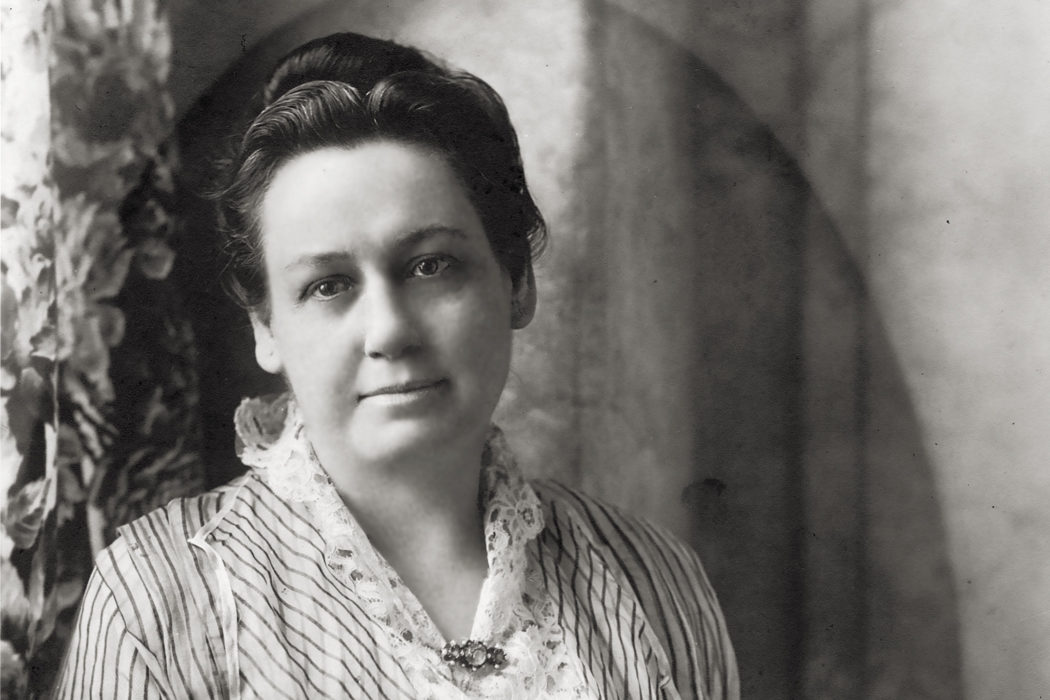TODAY CORINNE TRUE BURIED her last surviving son. Just yesterday she had helped ‘Abdu’l-Bahá lay the cornerstone for a new temple in Wilmette. If ever a life reflected the human quandary about the nature and meaning of suffering, that life belonged to Corinne True.
Corinne Knight True was born near Louisville, Kentucky, on November 1, 1861, seven months after the Civil War began. Her father, Moses Knight, was a Presbyterian minister. Her mother, Martha Duerson, was a Southern aristocrat who had inherited a plantation and some thirty slaves. When they married, Moses persuaded her to free the slaves. Nevertheless, he would side with his neighbors during the war – Moses was a proud Southerner.
After the Great Chicago Fire of 1871, Moses moved his family to the city – he had invested in real estate there, a fortuitous move that soon made the family wealthy.
Corinne was the eldest child. Growing up, she was everything her father expected. As she entered her teenage years, he sent her to one of the finest finishing schools in the land. Then Corinne fell in love with the next door neighbor, a man who shared her father’s name. While he respected young Moses True, he forbade his daughter to take the relationship any further. The problem? Moses True was a Yankee.
Corinne simply could not understand her father’s opposition. Would he deny her happiness simply because the man she loved came from the wrong part of the country? He sent her away to tame the love affair. It was then that Corinne did something rash – she got married in the municipal building of a small Indiana town with a stranger as a witness.
While Corinne’s relationship with her father deteriorated, her marriage and family life flourished. Within ten years she and Moses had eight children. The family was tightly knit and successful. They built a life in Chicago and were active members in a Protestant church.
Then nine-year-old Harriet fell down the basement steps.
Corinne’s marriage held together in the wake of her daughter’s death, but her religious beliefs failed her. Shortly after the death of Harriet, she and her husband left their Protestant congregation and began seeking out new brands of Christianity. First they turned to Unity, a progressive Christian movement. Then it was Christian Science. Then Divine Science.
In 1899 diphtheria swept through Chicago. Several of the True children contracted it, including the baby, Nathanael. Doctors scrambled throughout the city trying to contain the disease, but there was no reliable cure.
On the first of May, Nathanael took his final breath.
Moses was comforted by Divine Science. But Corinne could not find the answers she was looking for. She pored over books on Creation and theology, and attended lectures by leaders of new philosophies and religious teachings. Mrs. True first learned about Bahá’u’lláh in late 1899. More than 700 Bahá’ís lived in Chicago. She accepted the faith almost immediately.
Then seven-year-old Kenneth passed away.
‘Abdu’l-Bahá sent Corinne letters consoling her on the death of her boys. They were safe, he said, in the kingdom of God. She threw herself back into her religious work. But there was a problem. The city’s Bahá’ís had two parallel organizing bodies, one for men and the other for women. While Corinne served on and off as president and secretary of the Women’s Assembly of Teaching, she was dismayed. She wrote repeatedly to ‘Abdu’l-Bahá, questioning her religion’s commitment to the principle of the equality of the sexes.
In 1906, twenty-one-year-old Lawrence died in a sailing accident.

Corinne arrived in Palestine to see ‘Abdu’l-Bahá on February 25, 1907. Four years earlier, the Bahá’ís had asked his permission to build a house of worship in Chicago. He agreed, but the project sat idle. Now, ‘Abdu’l-Bahá told Mrs. True exactly what to do. A few days later, when a delegation of three men from Chicago arrived to consult about the plan officially, they were more than a little bit surprised to find ‘Abdu’l-Bahá simply unwilling to discuss it. “When you return,” he told them, “consult with Mrs. True – I have given her complete instructions.” Somehow, the Master had entrusted the community’s defining enterprise to a woman.
At Mrs. True’s instigation, a new national body was created to coordinate the work of the temple. ‘Abdu’l-Bahá made it clear that it must include women. It held its first convention in Chicago in March 1909. Delegates elected nine individuals to serve on the Executive Board of the Bahá’í Temple Unity. One of them was Corinne True.
Once again, she threw herself into the work even as her calamities mounted. Moses True died of a heart attack. Davis, her last surviving son, caught tuberculosis in 1910 and battled for nearly three years before passing away the night before ‘Abdu’l-Bahá laid the temple’s cornerstone in Wilmette.
Today, on the morning of May 2, 1912, Corinne buried her son. In the late afternoon ‘Abdu’l-Bahá asked her to join him at the Plaza Hotel. There, the two of them sat gazing through the window that overlooked Lincoln Park. It was an improbable scene: an elderly Middle Eastern man and an upper class white woman. But ‘Abdu’l-Bahá probably understood Corinne’s grief more than anyone else on this sad May morning, for not only did he also have children, but he, too, had lost all of his young sons.
Over the course of thirteen years ‘Abdu’l-Bahá had shaped Corinne True’s grief into purpose. He called her the “Mother of the Temple.”







